|
|
|
Sort Order |
|
|
|
Items / Page
|
|
|
|
|
|
|
| Srl | Item |
| 1 |
ID:
192279
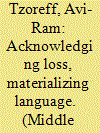

|
|
|
|
|
| Summary/Abstract |
This article focuses on Rabbi Yosef Hayyim's discussions of translation and hermeneutics, as a reflection of the broad movements between languages throughout the Ottoman Empire and the Indian Ocean, and the linguistic inequalities that characterized them. Reading Hayyim against his Baghdadi context, considering the printing and translational activities of the British missionaries of the London Society for Promoting Christianity amongst the Jews and the hermeneutics that were developed in the Baghdadi Salafiyya, I argue that Hayyim's opposition to the translation of Jewish Kabbalistic knowledge should not be seen as a conservative approach that prevents its popularization, but as an understanding of the linguistic power relations involved within the act of translation. Juxtaposed vis-à-vis his uses of Arabic translations in other responsas and his call for the teaching of standard Arabic in Jewish schools in Baghdad, that cohered with the Nahdawi perception of Arabic as a major aspect of the Ottoman Mashriq Arab political community, I argue that these incidents reflect different intersections of languages and power that occurred in the urban sphere of Ottoman Baghdad.
|
|
|
|
|
|
|
|
|
|
|
|
|
|
|
|
| 2 |
ID:
192285
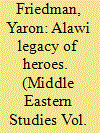

|
|
|
|
|
| Summary/Abstract |
The aim of this article is to provide evidence that the legacy of the Nu?ayr?- ?Alaw? Heroes has continued from medieval times to the present, where we can see it in the ongoing civil war in Syria
|
|
|
|
|
|
|
|
|
|
|
|
|
|
|
|
| 3 |
ID:
192287
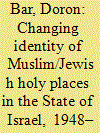

|
|
|
|
|
| Summary/Abstract |
Over the past seven decades, dozens of Muslim holy places in Israel have undergone a process of Judaization, becoming an integral part of the Israeli-Jewish sacred landscape. The current paper compares three waves of Judaization that followed the 1948 and 1967 wars, emphasizing the institutional and popular character of this process. The appropriation of Muslim holy places and their conversion is tied to the political, social, and religious changes that Israeli society underwent during its seventy years of existence. During these decades, Jewish holy spaces gained social, cultural, and religious importance; visiting them became a popular pastime. As the demand for holy places grew, former Muslim sites were converted and became part of Jewish sacred space. The process of transformation took place in parallel on two planes – the institutional and the popular – as both Israeli governmental bodies and worshipers converted Muslim holy places into Jewish sacred sites. The outcome of the process was the expansion of sacred space in the State of Israel and the inclusion of the periphery, which in many cases contained former Muslim holy places, as an integral part of the Jewish map of holy places.
|
|
|
|
|
|
|
|
|
|
|
|
|
|
|
|
| 4 |
ID:
192284
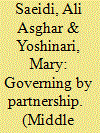

|
|
|
|
|
| Summary/Abstract |
This article will discuss the partnership of Abdolhossein Nikpour and the Chambers of Commerce with the Iranian government in managing the national economy from the 1920s until the 1950s. In particular, it challenges the state-society paradigm, where it shows that Nikpour, as well as other merchants and entrepreneurs of the Chambers nationwide, worked with the Iranian government while striving to maintain their economic and political autonomy. Conversely, the Iranian government depended on the expertise of these economic actors. Hence, this article will offer new perspectives on Iran’s twentieth-century political economy. Based on their collaborative research, including Iranian, Soviet, and British primary sources, the authors conclude that Nikpour was a driving force of both the Chambers and Iran’s modern economy for most of his lifetime, encompassing the interwar, wartime, and early postwar periods. Ultimately, however, Nikpour and the Chambers’ power was curtailed by Mohammad Reza Shah in the late 1950s.
|
|
|
|
|
|
|
|
|
|
|
|
|
|
|
|
| 5 |
ID:
192282
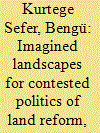

|
|
|
|
|
| Summary/Abstract |
In Turkey, land reform was subject to fierce debates among different political groups throughout the 1960s. Land occupations and small peasant demonstrations were seen as new forms of struggle to voice demands for land reform. This article explores the gender and class specific effects of global post-war American expansion policies on agrarian change and peasant struggle in the form of land occupations in rural Turkey. Focusing on the Aegean villages of Golluce and Atalan in the late 1960s, it argues that different political organizations imagined villages as laboratories to test their visions of land reform and the occupiers as a homogeneous class regardless of gender-specific claims. In doing so, it highlights the characteristics of rural class struggles and the politics of land reform with reference to social class and gender in Turkey in this period.
|
|
|
|
|
|
|
|
|
|
|
|
|
|
|
|
| 6 |
ID:
192288


|
|
|
|
|
| Summary/Abstract |
This article analyzes the collective narrative of the Christian-Arameans in Israel and the on-going process of identity building. Pursuing a collective definition alternative to the Christian-Palestinian identity, the Arameans claim indigeneity and peoplehood. With national recognition in Israel and international recognition among the trans-national Aramean community, Israeli Arameans are developing a collective identity and memory that differentiates them from the predominant Arab-Muslim surroundings. After investigating the underlying historical causes comprised of Islamization and a growing Christian-Muslim divide following the Arab Spring, this article explores the Aramean collective narrative and identity, including language, religion, symbols, and folklore. Moreover, it explores the relations to the Zionist dominant narrative in light of the Aramean collective claim to territory, aspiring to re-establish the Maronite village of Bar‘am after its evacuation in 1948 as an Aramean community. This article is based on a variety of sources, including archival, textual, audiovisual material and interviews.
|
|
|
|
|
|
|
|
|
|
|
|
|
|
|
|
| 7 |
ID:
192286


|
|
|
|
|
| Summary/Abstract |
Muhammad Surur was one of the early polemicists who criticized the Iranian Revolution and warned against the threat of Shiʿa domination of the Middle East. Years before the Iranian Revolution, Surur developed firm anti-Shiʿa convictions that provided the basis for his 1981 book Wa jaʾa dawr al-Majus [Then Came the Turn of Majus (Zoroastrians)]. While anti-Shiʿa rhetoric was certainly not unique to Surur, his specific emphasis on the political dimension of the sectarian divide played a significant role in popularizing such sentiments. The political context of his homeland of Syria, and especially the repression experienced by the Muslim Brotherhood under the allegedly ‘Nusayri (Alawi)’ Syrian regime, clearly informed this anti-Shiʿa treatise and contributed to special criticism of Syria’s Alawis. Geopolitics and great power competition constantly appear in his work, as Surur believed that the Iranians, like their Persian ancestors, had national ambitions in the neighboring Arab countries and sought to control the region with the help of the Arab Shiʿa, whom Surur saw as a ‘fifth column’.
|
|
|
|
|
|
|
|
|
|
|
|
|
|
|
|
| 8 |
ID:
192280
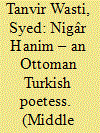

|
|
|
|
|
| Summary/Abstract |
The second half of the nineteenth century in the Ottoman Empire was a period when, with increasing literacy and education, combined with the growing role played by Turkish women in social and professional life, literary activity also registered a marked increase. Books, journals and newspapers in Turkish, and also in other languages, attracted high levels of readership. The article introduces the life and works of Nigâr binti Osman, certainly the most prominent female Ottoman Turkish poet of the closing decades of the Ottoman Empire. Over a hundred years after her death, interest in the life as well as the literary output of Nigâr Hanım remains high.
|
|
|
|
|
|
|
|
|
|
|
|
|
|
|
|
| 9 |
ID:
192281


|
|
|
|
|
| Summary/Abstract |
The Ottoman Empire and Ireland seem an unlikely pair in every respect. In the secondary literature, the paths of the two countries never converge. Except for Sultan Abdülmecid’s famous aid during the Famine, there has been virtually no discussion of the relationship between the two countries. By using the accounts of Ottoman authors and through a careful reading of archival materials from different eras, this article analyses the Ottoman perceptions of Ireland from the early modern era to the twentieth century. These documents and testimonies suggest that there was considerable interest in Ireland among Ottoman intellectuals and statesmen. They saw the country as some sort of anomaly which could be possibly useful in their dealings with Britain. For that reason, they diligently followed the developments taking place in Ireland. The case study developed in this article demonstrates first the importance of Ottoman archival materials for the purposes of comparative history; second the vibrant interest of the Ottoman Empire in the outside world in general and in Ireland in particular.
|
|
|
|
|
|
|
|
|
|
|
|
|
|
|
|
| 10 |
ID:
192283


|
|
|
|
|
| Summary/Abstract |
So far, no in-depth analysis of piracy in the Persian Gulf Cultural World has been undertaken since 1820, when a treaty was signed between the British and local sheikhs. Therefore, this article aims to systematize the occurrence of piracy in this region in the years 1873–1949. Over 80 studies by British colonial institutions were used for the analysis, so the topic is presented in its entirety from the perspective of the Crown. First, time intervals of several years with increased pirate activity were identified, and then on this basis two longer periods with a different scale and dynamics of piracy were designated: the period of widespread piracy (1873–1912) and the period of marginalized piracy (1913–1949). In the first period, piracy was a frequent phenomenon, especially in the territory of the Ottoman Empire: in the eastern part of the Arabian Peninsula and in the south of today’s Iraq. The reasons for this situation included high political instability of the region. During the second period, piracy dropped in scale and scope. Order in the region was introduced by the expansion of the Saudi State and the creation of independent states after the First World War, among other factors.
|
|
|
|
|
|
|
|
|
|
|
|
|
|
|
|
|
|
|
|
|